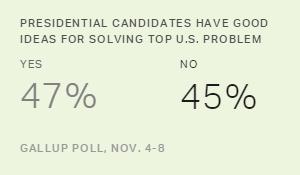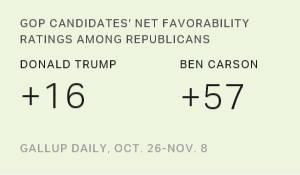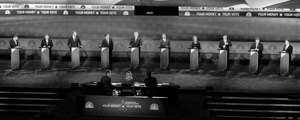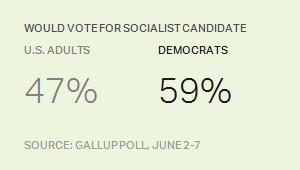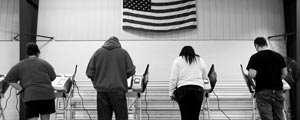Story Highlights
- 47% of Americans say candidates have good ideas to solve big problems
- Republicans are more positive than Democrats
- Americans view economy and government as top U.S. problems
PRINCETON, N.J. -- Americans are divided on whether any of the presidential candidates have come up with good ideas for handling the problem they see as the most important facing the country, with 47% saying "yes" and 45% saying "no." Republicans are most positive in their responses, with 60% saying the candidates have come up with good ideas for addressing the specific problem they name, compared with 42% of independents and Democrats who hold that view.
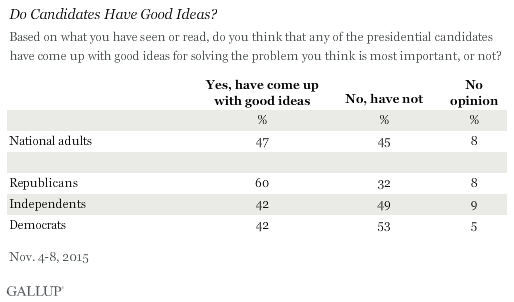
Gallup has asked Americans a variant of this question at least once in each of four prior election cycles. In January 1992, for example, only 29% of Americans thought the presidential candidates had come up with good ideas "for solving the country's problems," but by October the proportion had risen to 65%. This shift suggests that perceptions of the candidates' problem-solving ideas may change as the 2016 election year progresses.
Republicans may be more positive than Democrats in their views of the candidates' ideas for several reasons. There are 15 major Republican and three Democratic candidates actively campaigning to succeed Barack Obama as president. The larger GOP field is thus putting forth a much greater volume of proposals than the smaller Democratic field, increasing the probability that Republicans can find a candidate whose ideas for solving problems they agree with.
Secondly, there have been more Republican debates than Democratic debates so far in the campaign. This has given Republican candidates more opportunities to publicly expound on their policies, and rank-and-file Republicans more opportunities to hear their candidates' proposed solutions, than has been the case for Democrats.
Third, the GOP race is arguably getting more media attention, given its highly competitive nature and the novelty of non-politicians Donald Trump and Ben Carson as the current front-runners. That compares with the Democratic race in which Hillary Clinton's status as front-runner seems unlikely to be threatened by her less well-known challengers.
In contrast to the current findings, Gallup found that Democrats were much more positive on this question in January 2008, during another open-seat presidential election year. At that time, there were numerous major contenders running in both parties.
Americans View Economy, Government as Most Important Problems
Regardless of whether they think candidates have come up with good ideas for solving them, Americans' views of the specific problems facing the nation in November show little change from previous months. Mentions of the economy in general are up slightly to 17%, essentially tied with dissatisfaction with government (15%) at the top of the list. Mentions of immigration (9%) remain high, as they have in recent months, followed by unemployment, healthcare, ethics/morals and the federal budget deficit.
Race relations, which as many as 13% of Americans had mentioned last December and 9% in July, dropped back to 3% in this survey, although interviewing was completed prior to the intense focus on race relations over the past week on the University of Missouri's main campus -- culminating in the resignation of that university's president on Monday.
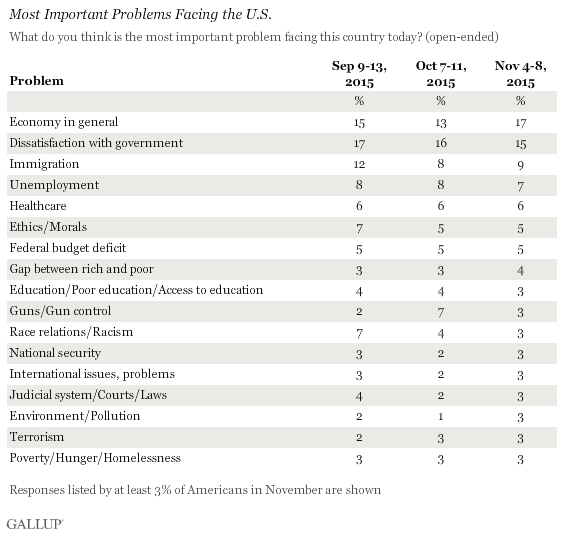
Americans who mention the top two problems -- the economy and dissatisfaction with government -- are not significantly different in their responses to the "have candidates come up with good ideas for solving this problem?" question than the overall average.
Bottom Line
Record numbers of viewers have watched both the Republican and Democratic presidential debates so far this year. Although some of the high ratings may be attributable to the entertaining candidates running for office, the high viewership levels also suggest that Americans are interested in what the candidates are saying they would do to fix the nation's problems. Less than half of Americans, at this juncture, think that any of the candidates have come up with good ideas for solving the problem they name as the most important facing the nation. That may well change as the campaign progresses, but to date many Americans -- particularly independents and Democrats -- are apparently still waiting to hear good ideas or haven't fully tuned in to the campaign yet.
Historical data for this question are available in Gallup Analytics.
Survey Methods
Results for this Gallup poll are based on telephone interviews conducted Nov 4-8, 2015, with a random sample of 1,021 adults, aged 18 and older, living in all 50 U.S. states and the District of Columbia. For results based on the total sample of national adults, the margin of sampling error is ±4 percentage points at the 95% confidence level. All reported margins of sampling error include computed design effects for weighting.
Each sample of national adults includes a minimum quota of 60% cellphone respondents and 40% landline respondents, with additional minimum quotas by time zone within region. Landline and cellular telephone numbers are selected using random-digit-dial methods.
View survey methodology, complete question responses and trends.
Learn more about how Gallup Poll Social Series works.
